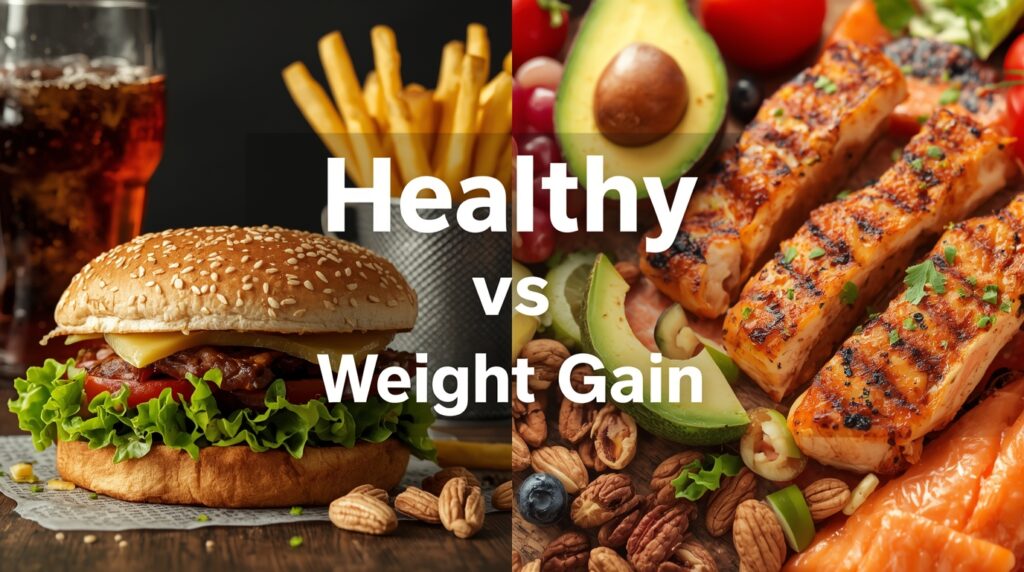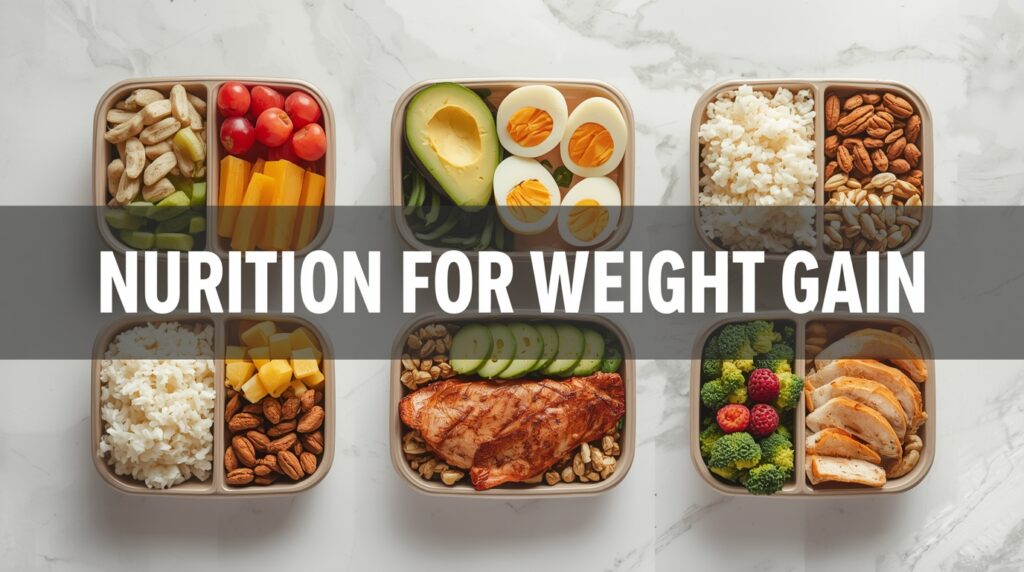
Gaining weight is often thought of as the exact opposite of what most people want. While some are constantly trying to shed extra pounds, there are also many who struggle to add healthy weight. For them, the scale barely moves no matter how much they eat or how many times they hit the gym. If this sounds familiar, you are not alone. Being underweight or unbleacto gain weight can be just as challenging and frustrating as losing it, and it requires just as much structure and consistency.

The truth is that gaining weight quickly is not about eating junk food or stuffing yourself with random calories. It is about building a lifestyle that supports growth — nourishing your body with the right foods, focusing on strength-building activities, and creating routines that encourage long-term progress. Weight gain is not a one-week trick; it is a sustainable process that helps you feel stronger, look healthier, and function better in everyday life.Before diving into what to eat or which exercises to follow, it’s important to understand why gaining weight feels nearly impossible for some people. Knowing the root of the problem is the first step to finding the right solution.
Why Gaining Weight Can Be Difficult
There is a common belief that people who are thin or underweight simply don’t eat enough. While this might be true in a few cases, the reasons often go deeper. Some individuals have naturally fast metabolisms, meaning their bodies burn calories faster than usual. Even if they consume large meals, the body uses up that energy quickly, leaving little left for building muscle or storing fat.Another challenge is appetite. Some people naturally feel full after small portions and find it hard to eat extra meals during the day. This makes it difficult to create the calorie surplus needed for weight gain. Genetics can also play a strong role. If most of your family members are naturally slim, your body might be wired to maintain a lean frame. This does not mean you cannot gain weight, but it does mean that you need a smarter approach.Lifestyle also affects progress. People with physically demanding jobs or those who play endurance sports often burn off more calories than they realize. Even eating more than average may not be enough if the body is in a constant calorie deficit. Stress, poor sleep, and irregular eating habits add more obstacles, making it a continuous struggle to move the scale.
Healthy vs Unhealthy Weight Gain
When trying to gain weight quickly, many people fall into the trap of eating anything and everything — fried snacks, sugary desserts, or processed fast food. While this may move the scale, it rarely leads to better health or strength. Excess junk food often results in belly fat, low energy, and a higher risk of long-term problems like diabetes or heart disease.Healthy weight gain is different. It focuses on building lean muscle, improving bone density, and boosting overall vitality. The goal is not just to look bigger but also to feel stronger, sharper, and more energetic. A structured approach includes nutritious meals, consistent exercise, proper rest, and gradual progress. This kind of growth lasts longer and supports your overall well-being instead of harming it.
Nutrition for Weight Gain

Food is the foundation of weight gain. To build size, the body needs to be in a calorie surplus, meaning you must consistently eat more calories than you burn. However, this does not mean eating random foods or overeating in a way that makes you sluggish. The key is to choose calorie-dense, nutrient-rich foods that support your health.Instead of sticking to just three large meals, spreading your food intake across the day works better. Breakfast, lunch, dinner, plus two or three snacks can help you eat more without feeling too full at once. Each meal should have a balance of proteins, carbohydrates, and healthy fats.Proteins play a critical role in repairing and building muscle. Foods like eggs, fish, chicken, lean beef, lentils, beans, tofu, and full-fat dairy products should be part of your daily meals. Pairing protein with resistance training ensures that the extra calories go toward muscle development instead of fat storage.Carbohydrates are equally important. They provide energy for workouts and daily activity while helping muscles store glycogen. Whole grains, oats, rice, potatoes, fruits, and beans are excellent choices that also provide fiber and micronutrients.Healthy fats are often overlooked but are essential for both calorie intake and hormone regulation. Avocados, nuts, seeds, olive oil, coconut, and fatty fish like salmon or sardines are excellent options. A drizzle of olive oil on your meals or a handful of nuts between meals can add hundreds of healthy calories without making you feel stuffed.An underrated but highly effective method is drinking your calories. Smoothies or shakes made with milk, nut butter, oats, bananas, honey, and protein powder can easily add 500–800 calories in one serving. For those with smaller appetites, this is a practical way to consume more energy without overwhelming the stomach
Exercise and Muscle Growth
It may sound strange, but exercise is essential when you are trying to gain weight. The goal is not to burn off calories but to direct them toward building muscle. Strength training helps your body use the extra food for growth, leading to a stronger and more toned physique rather than just fat storage.The most effective approach is resistance training, focusing on compound exercises that target multiple muscles at once. Squats, deadlifts, bench presses, pull-ups, and overhead presses stimulate muscle growth while also boosting natural hormones like testosterone and growth hormone. These movements build a strong foundation and deliver faster results than isolated exercises.For beginners or those without gym access, bodyweight routines still work well. Push-ups, planks, squats, and resistance band workouts can all trigger muscle growth. The important thing is progression — gradually increasing weight, resistance, or intensity over time.Cardio should be approached carefully. While it supports heart health, excessive running or high-intensity workouts can burn off the very calories you are trying to store. A light jog, cycling, or brisk walking a few times a week is enough to keep your heart strong without slowing down your progress.
Rest Recovery and Stress

Muscle growth does not happen in the gym; it happens while you rest. Recovery is just as important as lifting weights or eating more. Without proper sleep, the body cannot rebuild and grow. Aim for at least seven to nine hours of good-quality sleep every night.During deep sleep, growth hormone is released, which helps repair tissues and build new muscle. Poor sleep, on the other hand, disrupts this process and leaves you feeling drained. Think of sleep as part of your training program, not something separate from it.Stress management is also critical. High stress levels can interfere with appetite, digestion, and recovery. Simple practices like meditation, breathing exercises, short walks, or spending time in nature can reduce stress hormones and support weight gain. A calm mind helps your body stay in a growth-friendly state.
Supplements for Support
Supplements are not magic, but they can be useful when used correctly. They should never replace whole foods, but they can make your journey smoother. Protein powders are the most common, offering a convenient way to meet daily protein needs. A post-workout shake or a blended smoothie can close the gap when meals fall short.Creatine is another widely researched supplement that supports muscle growth and strength. It helps improve performance during high-intensity exercises, allowing you to push harder and recover faster.Mass gainers, which combine protein, carbs, and fats, can be helpful for people with extremely fast metabolisms or very poor appetites. However, not all mass gainers are high-quality, so checking the ingredients is important to avoid excessive sugar and fillers.
Measuring Progress the Smart Way
Many people become discouraged when the scale does not move quickly, but weight gain should be tracked with patience. Daily fluctuations in water weight and digestion are normal. Instead of obsessing over every weigh-in, focus on weekly or monthly trends.Strength improvements in the gym, better energy levels, increased appetite, or changes in how your clothes fit are often better indicators than the scale alone. Taking progress pictures every few weeks is also a powerful way to notice small changes that might not be visible day to day.
Building a Long Term Routine
The most important part of weight gain is consistency. Quick fixes may show temporary results, but they rarely last. A realistic and healthy goal is to gain about half a kilogram to one kilogram per week. Faster than that usually means more fat than muscle is being gained.Meal planning is one of the best strategies for success. Preparing meals in advance ensures that you never skip important calories. Keeping snacks like nuts, dried fruit, or protein bars nearby also makes it easier to hit your daily targets.Patience is key. Just as losing weight takes time, building a stronger, healthier body does not happen overnight. The journey may feel slow, but every meal, workout, and hour of rest is moving you closer to your goal.

Ending Note
Gaining weight fast in a healthy way is about more than eating extra food. It is about creating a balanced lifestyle where nutrition, exercise, rest, and mindset all work together. By focusing on calorie-rich whole foods, strength-building routines, proper recovery, and consistency, you can transform your body without harming your health.Remember that every person’s journey is unique. Some may gain faster than others, but what matters most is progress in the right direction. Stay patient, stay consistent, and trust the process. With time and commitment, you will not only gain weight but also strength, energy, and confidence that lasts.

Leave a Reply